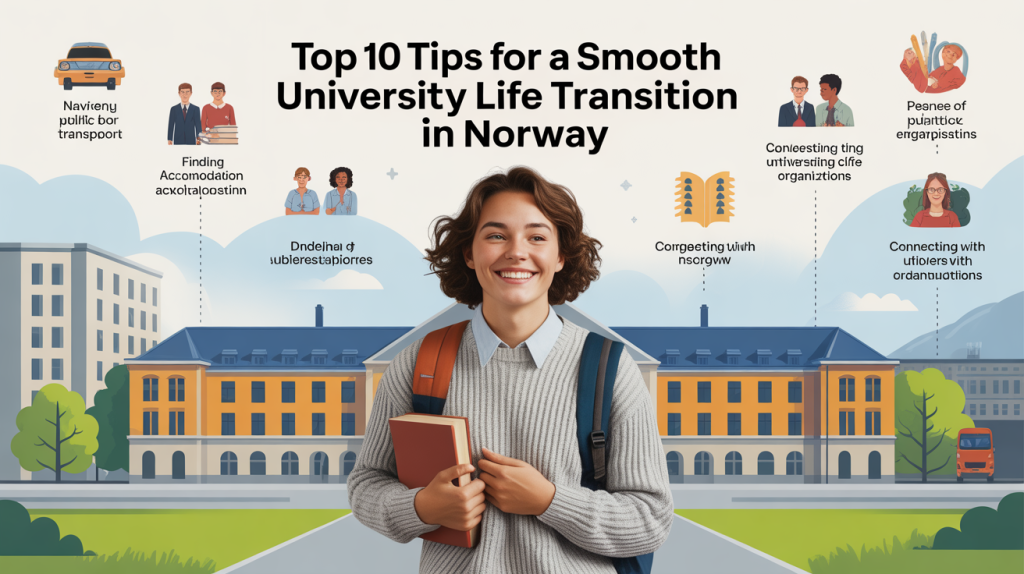Top 10 Tips for a Smooth Transition to University Life in Norway
Table of Contents
- 1. Do Thorough Research Before Arrival
- 2. Choose the Right Program and University
- 3. Check All Eligibility and Admission Requirements
- 4. Confirm Language Proficiency Requirements
- 5. Stay Organized with Application Deadlines
- 6. Get Acquainted with the Norwegian Academic Culture
- 7. Prepare Financially and Understand Living Costs
- 8. Participate in Orientation and Student Life
- 9. Understand Visa and Residency Requirements
- 10. Embrace Norwegian Culture and Lifestyle
- How Study in Norway Supports Your Transition
- Conclusion: Start Your Journey with Confidence
1. Do Thorough Research Before Arrival
Thorough research is the foundation of a successful transition. Students need to explore Norwegian universities, academic programs, and student life options carefully. Key factors include:
- Program offerings: Understand course content, specializations, and teaching methods.
- Institution reputation: Evaluate faculty expertise and university rankings.
- Location and campus culture: Urban vs. rural campuses can greatly affect lifestyle and opportunities.
- Long-term goals: Align program choices with career ambitions.
2. Choose the Right Program and University
Selecting an academic program that matches a student’s background and aspirations is essential. Students should:
- Review course curricula and specializations.
- Assess teaching styles and evaluation methods.
- Speak with academic advisors or coordinators.
- Confirm compatibility with previous qualifications.
Study in Norway supports this process by connecting international students with universities that fit their goals and qualifications, ensuring a seamless match that fosters academic success.
3. Check All Eligibility and Admission Requirements
Every institution in Norway has specific admission criteria, often including:
- Completion of secondary education or equivalent.
- Relevant academic prerequisites.
- Proof of language proficiency.
- Submission of standardized test scores or portfolios where applicable.
International qualifications may require validation or additional documentation. Recruiters and admissions professionals should maintain up-to-date checklists and streamline communication about these requirements to avoid delays or application rejections.
4. Confirm Language Proficiency Requirements
Understanding language expectations is crucial because:
- Undergraduate courses: are predominantly taught in Norwegian.
- Graduate and doctoral programs: often utilize English.
Students must provide accepted proof of proficiency via recognized tests or transcripts. Study in Norway offers resources and counseling on language requirements, helping agencies and universities guide applicants efficiently.
5. Stay Organized with Application Deadlines
Application timelines vary significantly between universities and programs. Important considerations include:
- Monitoring deadlines for submission of documents.
- Preparing recommendation letters or portfolios if needed.
- Ensuring visa and funding applications coincide with academic deadlines.
Admissions teams benefit from automation tools that track and remind applicants of key dates. Study in Norway’s recruitment platform facilitates this process, reducing administrative overhead and increasing application success rates.
6. Get Acquainted with the Norwegian Academic Culture
The Norwegian higher education system values:
- Independent thinking and self-directed study.
- Research-based instruction with critical analysis.
- Open discussions and collaborative learning.
- A grading system primarily using A–F or ECTS credits.
Preparing students for these academic norms reduces culture shock and helps them adapt quickly. Orientation programs and pre-arrival webinars can familiarize students with classroom expectations and assessment criteria.
7. Prepare Financially and Understand Living Costs
While tuition is free or low-cost for most international students, living expenses in Norway are relatively high. Students should budget for:
- Accommodation and utilities.
- Food and transportation.
- Study materials and personal expenses.
Awareness of these costs enables better financial planning. Additionally, students could explore scholarship opportunities and part-time employment options permitted under their visa agreements.
8. Participate in Orientation and Student Life
Active engagement in orientation and campus activities supports social integration and academic adjustment. Benefits include:
- Networking with peers and academic staff.
- Learning about support services and extracurricular opportunities.
- Developing a sense of belonging within the student community.
Universities often organize welcome weeks and student organization fairs. Study in Norway promotes these initiatives through our platform, enhancing students’ overall experience and retention.
9. Understand Visa and Residency Requirements
International students must navigate visa and residence permit processes, which involve:
- Application submission well before arrival.
- Providing proof of admission, financial means, and accommodation.
- Complying with any specific conditions tied to student visas.
Professional guidance through this legal framework is essential. Study in Norway collaborates with universities and international offices to ensure students receive accurate and timely advice.
10. Embrace Norwegian Culture and Lifestyle
Integration into Norwegian society enriches the educational experience. Students are encouraged to:
- Learn basic Norwegian language skills.
- Participate in cultural and community events.
- Explore local traditions and nature.
Such involvement helps reduce homesickness and increases cultural competency, valuable for academic and personal growth.
How Study in Norway Supports Your Transition
As the leading platform for international student recruitment and education solutions in Norway, Study in Norway offers comprehensive services designed to simplify the transition:
- Personalized recruitment assistance: Matching students with suitable programs and universities.
- Automated application management: Streamlining document collection and deadline monitoring.
- Pre-arrival counseling: Providing insights into academic culture, visa processes, and student life.
- Partnership opportunities: Collaborating with universities, recruitment agencies, and edtech firms to deliver tailored solutions.
Our expertise ensures both students and educational institutions can focus on what matters most — success and satisfaction in Norwegian higher education.
Conclusion: Start Your Journey with Confidence
Transitioning to university life in Norway is a multi-faceted process that requires preparation, organization, and cultural openness. By following these top 10 tips for a smooth transition to university life in Norway, international students, recruiters, and education professionals can contribute to creating a rewarding academic journey.
To learn more about how Study in Norway can support your international recruitment efforts or provide student services that enhance transition success, contact us today. Together, we can build a brighter future for global education in Norway.
Take the Next Step with Study in Norway
Explore further opportunities for enhancing your academic journey with Study in Norway.

